Due to cuts by the USDA, Agroecology Commons will offer fewer services to fewer aspiring farmers from underserved communities.

Due to cuts by the USDA, Agroecology Commons will offer fewer services to fewer aspiring farmers from underserved communities.
July 29, 2025
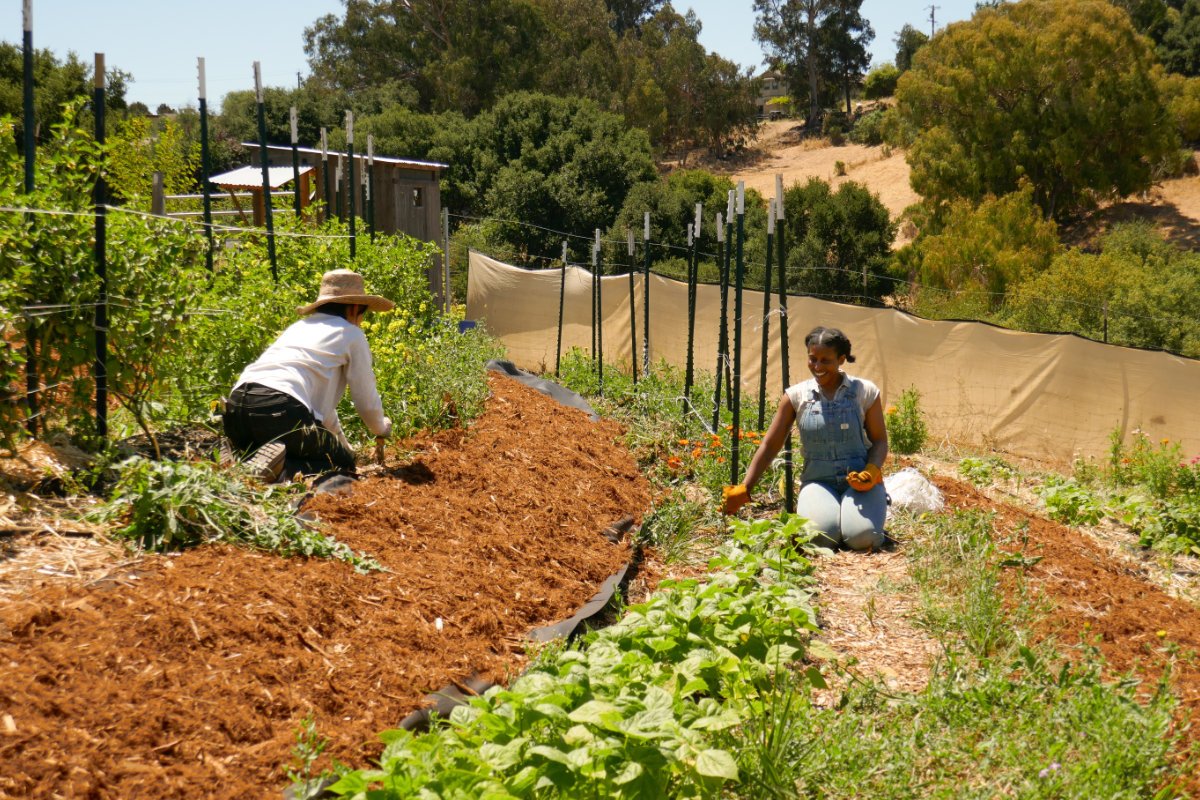
Volunteers Noelle Romero (left) and Corinne Smith (right) pull weeds around a row of tomato plants during a community work day at the Agroecology Commons farm. (Photo credit: Riley Ramirez)
Lesley Swain spent most of her adult life teaching English to middle and high school students in Oakland and Hayward, California. The 51-year-old used to joke with herself that when she retired, she would become a farmer. Then, about two years ago, Swain decided she didn’t want to wait any longer. She quit her job and started looking for agricultural work. But with no farming on her resume, she struggled to find opportunities to gain experience.
Expand your understanding of food systems as a Civil Eats member. Enjoy unlimited access to our groundbreaking reporting, engage with experts, and connect with a community of changemakers.
Already a member?
Login
Eventually she found Agroecology Commons, a small nonprofit farming collective based in nearby El Sobrante, where she signed up for Bay Area Farmer-to-Farmer Training (BAFFT), a nine-month program for beginning farmers. Swain is now an apprentice with Berkeley Basket, an urban backyard community-supported agriculture project, through a program that Agroecology Commons offered to BAFFT graduates.
“It’s given me a path that is so healthy,” Swain said. “This is what I want to do, and I didn’t know how I was going to do it.”
Agroecology Commons has helped aspiring farmers like Swain since its founding five years ago. But like many organizations, it must now do more with less.
It was among hundreds of programs whose grants have been canceled by the U.S. Department of Agriculture (USDA).
“We’re hoping that we’re successful in fundraising and campaigning to offset some of the losses,” said Jeneba Kilgore, one of four Agroecology Commons co-directors. “[But] I don’t think we’ll completely recuperate everything that was lost as a result of the federal cuts.”
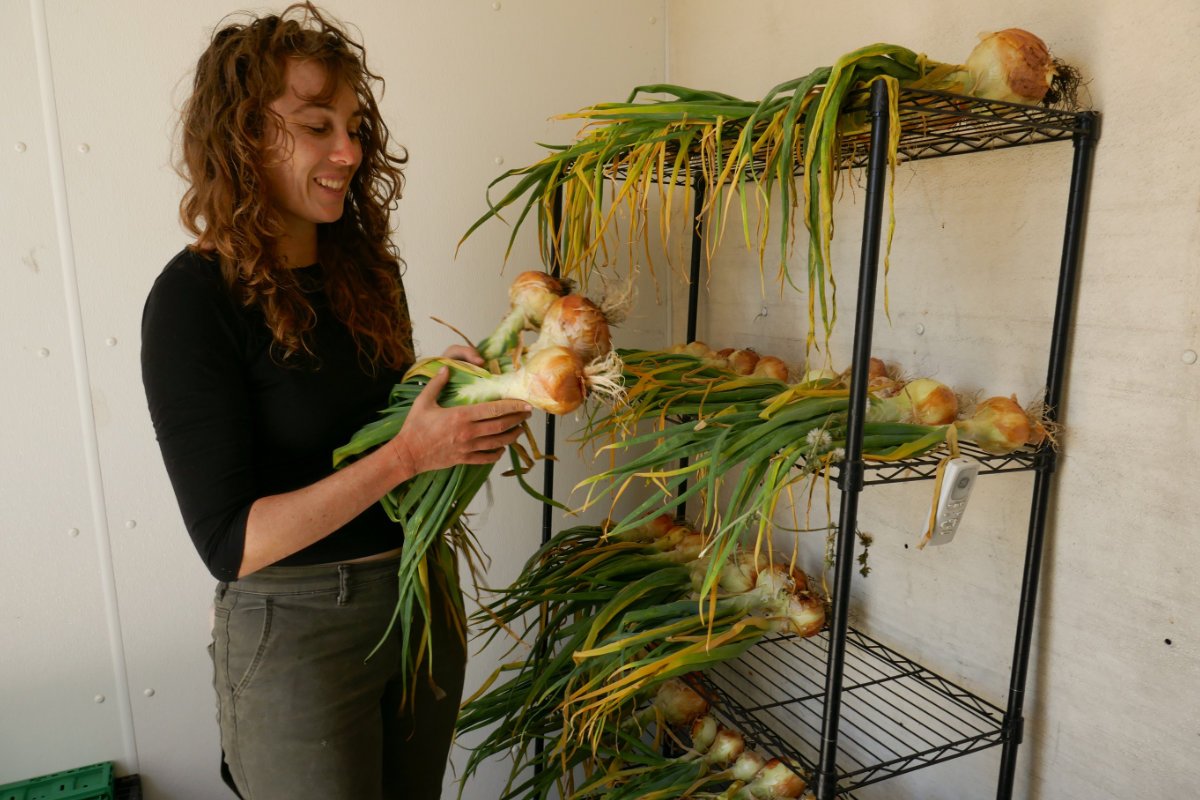
Agroecology Commons co-director Brooke Porter admires the onions grown on the Agroecology Commons farm. (Photo credit: Riley Ramirez)
Agroecology Commons was formed in 2020 by an eclectic group of Bay Area farmers, educators, artists, and cooperative business owners who were passionate about the intersection of land and liberation. They have spent the last five years creating programs and providing spaces for farmer-to-farmer education and relationship-building for low-income and minority farmers.
The group grows a range of produce, including cherry tomatoes, onions, and beans, on three acres of land tucked into the hillside of a suburban neighborhood. They raise goats and harvest honey. And they run a center dedicated to educating farmers and community members about farming and land stewardship.
In August 2022, the USDA announced plans to allocate up to $300 million in funding to projects that enable underserved producers to access land and technical support. The funding was made available under the Increasing Land, Capital, and Market Access Program (ILCMA), which aimed to help those producers move from “surviving to thriving.”
“It’s a seismic blow, but at least we know and can start the next steps.”
In June 2023, Agroecology Commons was among 50 recipients the USDA selected from across the country. It was awarded a $2.5 million grant to find, buy, and develop land for up to 10 “BIPOC, LGBTQIA, and landless farmers” in the Bay Area. The same year, the Commons was awarded a three-year, $397,000 grant through the Community Food Projects Competitive Grant Program—a small program designed to address food and nutrition security in marginalized communities—also through the USDA.
“The ILCMA grant was revolutionary,” said Kilgore, who, with a background in cooperative business, is the “numbers” person on the team. The first program of its kind in the area, Agroecology Commons “was really going to support so many people that have been historically removed from the land in really harmful ways, and support their future generations.”
Not long after the Trump administration took office, however, the USDA froze the grants—first the Community Food Projects grant, then the ILCMA grant—making the money inaccessible for months.
At last, Agroecology Commons received a termination notice for the Community Food Projects grant on March 7, but has yet to receive an official termination notice for the ILCMA grant. However, Kilgore said the grant has been removed from their Automated Standard Application for Payments (ASAP) portal—the portal used by federal agencies to disburse funds to recipient organizations. In addition, although the organization wasn’t named, the USDA publicized that a $2.5 million grant for a Bay Area ILCMA project was canceled in a June press release.
Since the beginning of this year, the USDA has terminated a number of grants that had been offered to food and farming organizations across the county, canceling billions of dollars in funding. Some programs—such as one that provided funding for governments to purchase local food, and another that supported small farms and food businesses around the country—have been completely canceled. Others, like the Farmers Market Promotion, Community Food Projects Competitive Grant, and the ILCMA program, have not been ended altogether but have had individual contracts canceled.
About 35 percent of the Commons’ work is funded by the state, foundations, individual donors, and earned income. But the remaining 65 percent of the work was made possible by these federal grants.
“It’s a seismic blow, but at least we know and can start the next steps,” Leah Atwood, another Agroecology Commons’ co-director, told Civil Eats in June.
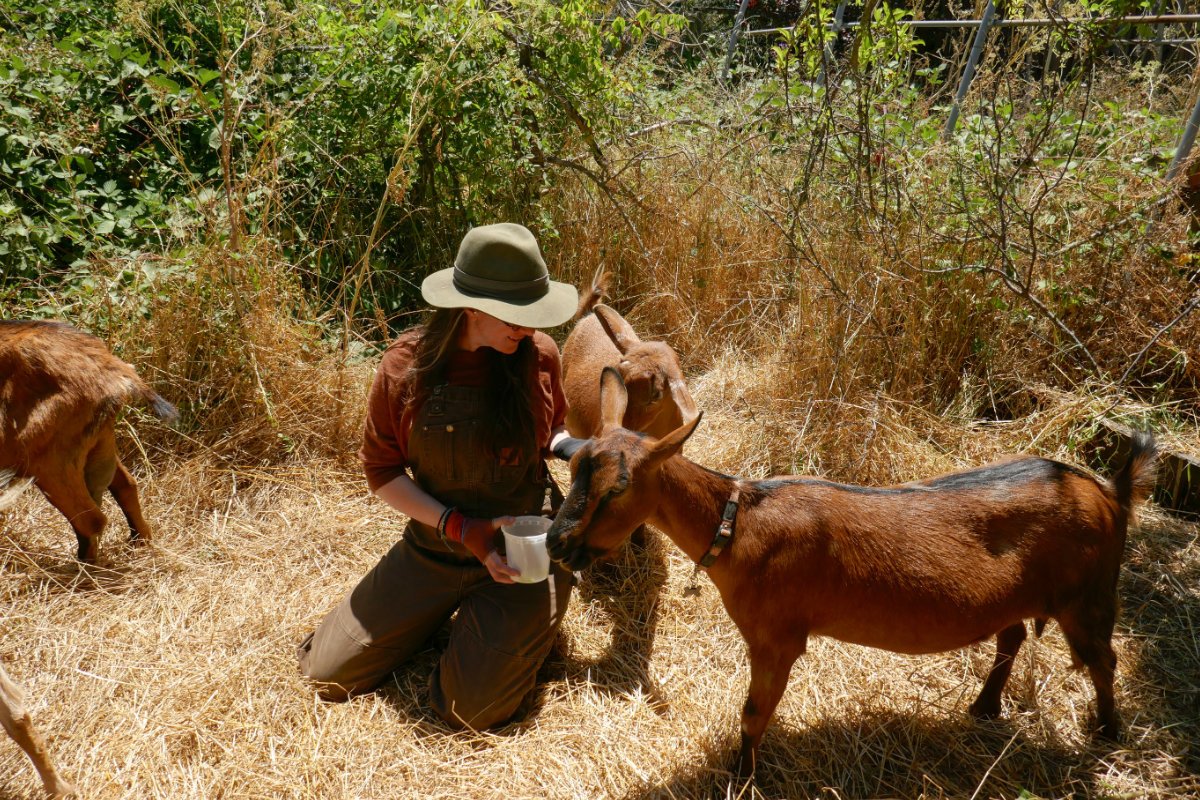
Co-director Leah Atwood feeds Agroecology Commons’ goats a special treat of vegetable scraps and plums. (Photo credit: Riley Ramirez)
Systemic barriers have historically made it harder for marginalized farmers to access the land and resources necessary to build lucrative businesses. Today, 95 percent of producers in the U.S. are white and 64 percent are male, according to the 2022 USDA Census of Agriculture.
“There are a lot of young farmers that don’t have access to land or inherited wealth and are not going to be able to disrupt that 95 percent ownership reality by just trying to go at it by themselves,” Atwood said.
The majority of the ILCMA grant was going to be used to purchase land to establish a commons—a collaborative system where land is owned and managed collectively, rather than by sole owner—for BIPOC, queer, and landless farmers. The grant was also going to fund 60 percent of Agroecology Commons’ staffing capacity for the next three years.
“I wish they would just say that they don’t want to support people of color, and they just want to support white men, because that is what they’re implying.”
The organization planned to purchase land in several counties across Northern California. They had already built a relationship with a real estate agent, Kilgore said, and had a list of sites that they were interested in purchasing, but before the team was able to move forward, the grant was frozen.
“When it came to the ILCMA grant, we were doing all the things that they said,” Kilgore said. “We’re supporting farmers; we’re supporting economic development; we’re supporting people to pull themselves up by their own bootstraps; we are giving people the opportunity to start their own business,” she said. “I wish they would just say that they don’t want to support people of color, and they just want to support white men,” she continued, “because that is what they’re implying.”
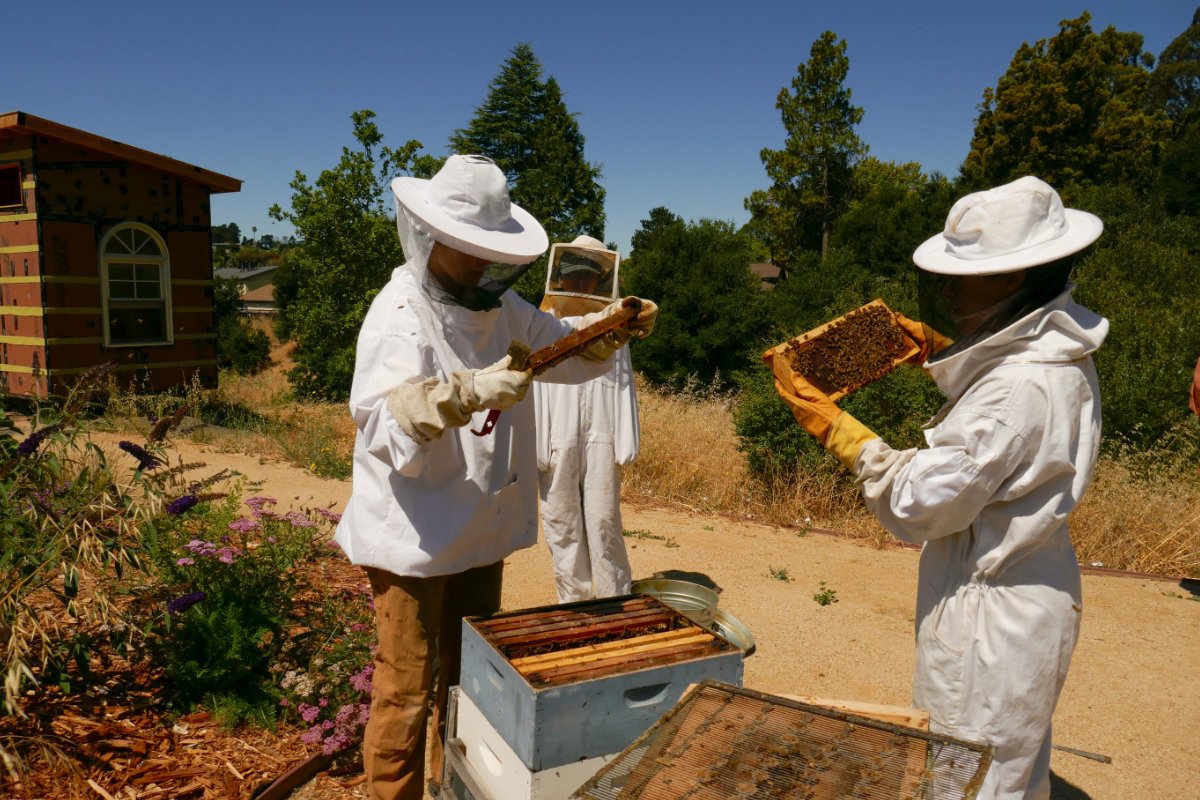
Brooke Porter (left) and volunteers Zoe Meraz (right) and Noelle Romero (center) inspect hive frames heavy with honey, making sure that the hives are healthy. (Photo credit: Riley Ramirez)
In addition to broadening land access, the Agroecology Commons seeks to pass on agricultural knowledge to those who may have trouble accessing it otherwise. It was using a second pot of federal money, the Community Foods Projects grant, to help fund training programs such as the BAFFT program Swain participated in.
The program not only gives participants the chance to learn, experiment, and practice land stewardship under the guidance of experienced mentors, but also enables them to take online courses from global partners on a range of topics, including social movements in agrarian reform, agroecology, and food sovereignty.
Once they complete the curriculum, new farmers can apprentice at Bay Area farms. Of the 40 BAFFT graduates so far, 17 are currently working as apprentices on 12 different farms, according to Brooke Porter, a co-director of the Commons. To alleviate socioeconomic conditions that might prevent new farmers from being able to gain experience, the Commons makes a point of paying both the apprentices and their mentors.
Oftentimes, opportunities for young farmers to gain essential on-farm skills require them to provide free time and labor, which requires a certain level of privilege, Porter said. Agroecology Commons’ program challenges that status quo, giving disadvantaged farmers the boost they need to get started.
“This is an opportunity to really change the dichotomy of how people typically get to learn on-farm skills,” Porter said.
“This is deeper than what I do for my career. This is ancestral work for me.”
The Berkeley Basket CSA program is currently hosting two of the Commons’ apprentices—Swain and Cielo Flores, 31. Flores, whose family from El Salvador has a deep history in agriculture, said he signed up for the farmer training program because he was interested in learning how to start his own farming project and cooperative. The program and apprenticeship provided him a template for how he could approach his own project.
“I wouldn’t be doing this without their support,” Flores said. “Agroecology Commons is trying to support me in my vision to become a farmer, to become a land steward. This is deeper than what I do for my career. This is ancestral work for me.”
Moretta “Mo” Browne, who joined Berkeley Basket CSA in 2019 and now owns it, is grateful that Agroecology Commons pays both hosts and participants in the apprenticeship program.
“I already wanted to be a part of it, but the fact that they were able to compensate folks really feels like they understand how exploitative this work can be,” they said. Additionally, getting paid to be a mentor only sweetens the deal. “Being able to live out your dream of being a farmer shouldn’t come at the cost of having a roof over your head or putting food on the table,” they said.
In addition to the apprenticeship opportunity, the Commons offers its El Sobrante incubator farm as a space where BAFFT program graduates can start their own farm projects and continue gaining hands-on training. The 3-acre plot has shared infrastructure, a tool-lending library, and tractors, helping eliminate the structural barriers to successful farming.
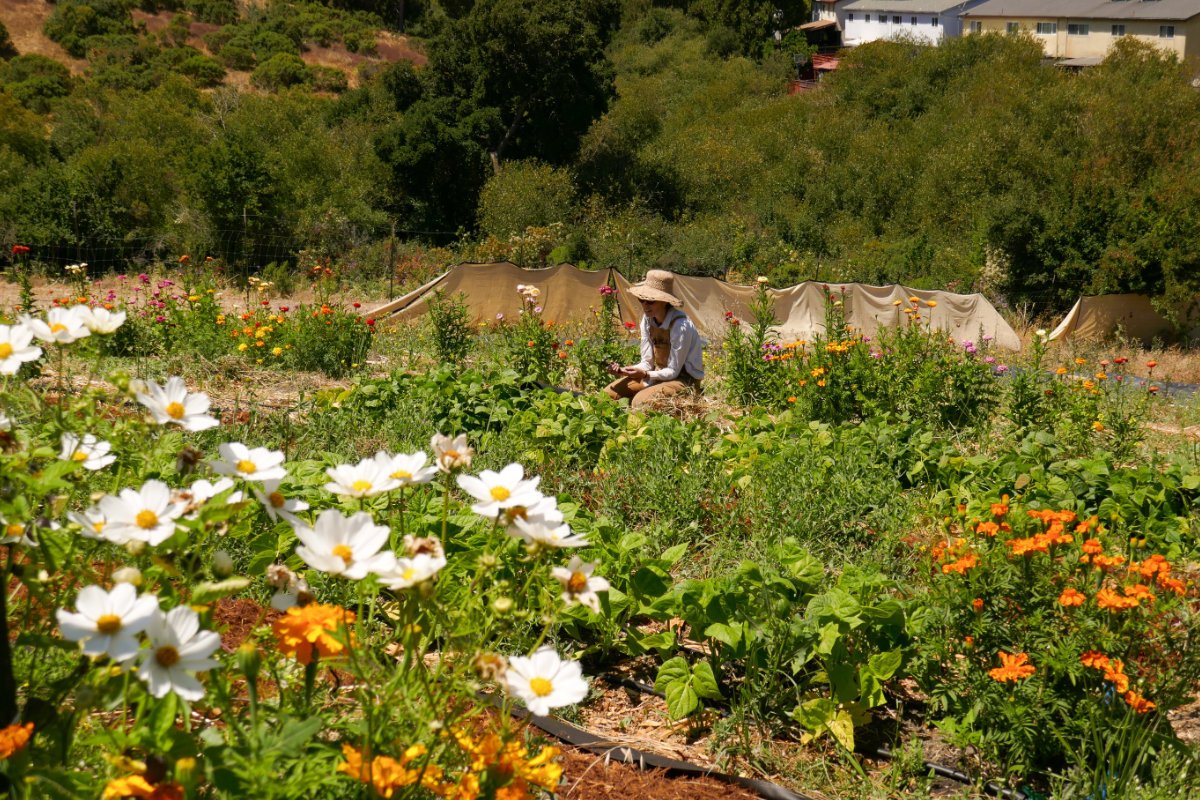
Among vegetables like tomatoes and onions, Agroecology Commons grows an array of native flowers on the farm. (Photo credit: Riley Ramirez)
In March, Secretary of Agriculture Brooke Rollins announced in a video on Instagram that the USDA had canceled the Agroecology Commons’ Community Food Projects grant. She stated that the termination was because the grant aimed “to educate queer, trans, and BIPOC urban farmers and consumers about food justice and values aligned markets.”
“We knew a lot of our language has the DEI buzzwords that they’re looking for and the climate focus that they have been targeting, so [the termination] didn’t come out of thin air,” Atwood said.
Only about $32,000 of the grant remains. As a result, the organization has had to pause some projects, such as the creation of financial literacy and cooperative business-planning workbooks. It also cut back on the number of apprenticeship hours it can offer. Last year, Porter said, the Commons offered apprentices the option to do 250- or 500-hour apprenticeships, but this year, it could only offer the lesser of the two.
“It is a much different learning experience, obviously,” she said.
As for the ILCMA grant, it wasn’t until June that Agroecology Commons became aware that it too was likely designated for cuts. A USDA press release announcing the cuts cited a $2.5 million grant “for expanding equitable access to land, capital, and market opportunities for underserved producers in the Bay Area” as an example of one of the terminated programs.
“Putting American Farmers First means cutting the millions of dollars that are being wasted on woke DEI propaganda,” Rollins said in the press release. “Under President Trump’s leadership, I am putting an end to the waste, fraud, and abuse that has diverted resources from American farmers and restoring sanity and fiscal stewardship to the U.S. Department of Agriculture.”
When asked in an email for further details regarding the grant cancellations, the USDA press office declined to comment.
While Agroecology Commons has yet to receive an official termination letter for the ILCMA grant, Kilgore said it is hard to move forward when they don’t know what might happen next. The organization has had to pause progress on its land commons project and shift its plans to bring on four more full-time employees to only two part-time staff.
Because of the financial constraints that have resulted from the grant terminations, the Commons has had to cut another program, Farmer Wellness Days, which has provided more than 145 farmers with acupuncture, massages, or chiropractic work.
“Try to imagine building something and choreographing planning on quicksand,” Atwood said. “It’s so much of an energy drain trying to figure out how to accommodate that.”

Former street dog Guistino, also known as “Goose,” spends his days adventuring around the Agroecology Commons. (Photo credit: Riley Ramirez)
Despite this, the organization has not given up. In June, Agroecology Commons joined five other groups to sue the USDA over the termination of the Community Food Projects grant. Their legal team later amended the complaint to add the ILCMA grant, after becoming aware of its likely cancellation.
The plaintiffs filed a motion for preliminary injunction on June 26, asking the court to stop the USDA’s behavior from continuing and for relief for the plaintiff grantees, according to FarmSTAND, a food-system-focused legal advocacy organization.
David Muraskin, managing director of litigation at FarmSTAND and one of the attorneys representing the case, said with the brief in support of the motion complete, the court can now issue an order. They hope a ruling will be made within a few weeks, he said, but it could also take months. And if the case moves to the appeals court, it could take a year at minimum.
While federal funding cuts have forced Agroecology Commons to scale down some of its initiatives, state funding has enabled the group to expand another one of its programs, which provides young farmers with financial resources to start their own farming operations.
The seed grant program—which addresses resource inequity among beginning farmers—has typically offered $1,000 to $5,000 grants to BAFFT graduates and the apprentice program’s hosts. This year, however, the organization will be able to offer eligible farmers up to $50,000 in seed grants after the California Department of Food and Agriculture (CDFA) awarded the program $784,000.
Prior to receiving the CDFA grant, 26 seed grants had been given out, totaling nearly $69,000, Porter said. This year $400,000 will be distributed to people in the Bay Area, who, like Lesley Swain, are pursuing their farming dreams.
Agroecology Commons may be able to help fewer new farmers, but they’re still offering a vital source of support, and they aren’t giving up.
“We’re not retracting any of our goals,” Atwood said. “We are continuing to be outspoken that we do believe that this type of work needs to center BIPOC, queer, and landless farmers.”
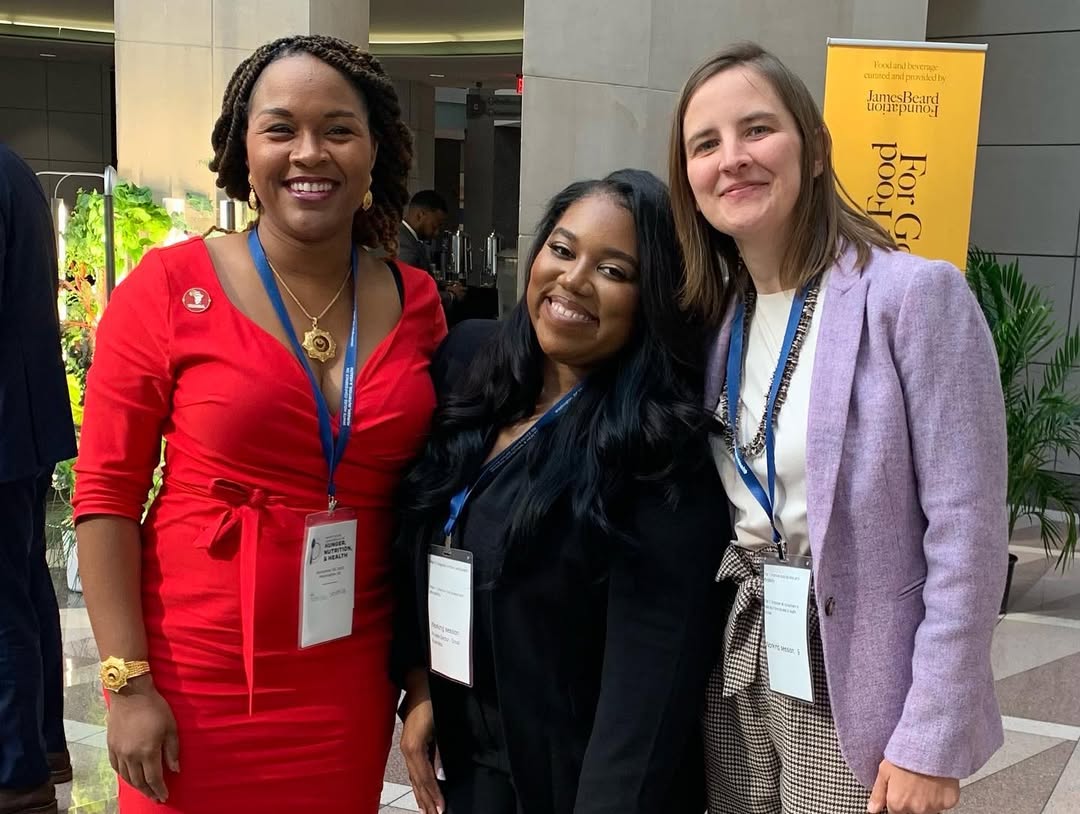
July 30, 2025
From Oklahoma to D.C., a food activist works to ensure that communities can protect their food systems and their future.
January 20, 2025
July 23, 2025

Leave a Comment